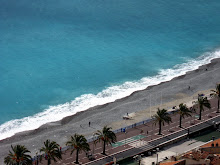I think maybe I'll write a little more about my reactions to these reactions later, add some more personal examples. But this is long enough for now.
The foreign policy of the Obama administration should be in keeping with today’s America: the president wants to negotiate with traditional enemies of Washington, including Tehran. Not out of naïveté, but because he adheres to the belief of Kissinger, Secretary of State for presidents Nixon and Ford, that “diplomacy (is) the art of restraining power.” But he is inheriting errors of the past, errors made worse by the chaos in the Middle East and Afghanistan. With his departure from the Oval Office, George W. Bush has single-handedly reaffirmed the United States’ authority in the world. But he’s left very little breathing room for his successor.
Near East (meaning Israel and Lebanon?)
… “He has given some promises to Israel, but he’s one of the most ardent defenders of a “two-state” solution”, emphasized Joseph Nye, professor at Harvard and originator of the concept of soft power, a mix of using influence and seduction as persuasion. …The president isn’t ignoring the complexity of the Israel question. “The new president’s team has promised to approach head-on these interconnected questions of the Middle East” (Scott Lasensky, researcher at the US Institute of Peace). These include negotiations between Israel and Syria and their effect on Iran’s influence in the region.
Iraq
The removal of US troop from Iraq is ideally going to be complete before the end of 2011. This leads to optimism that some will think excessive: “the Bush era was characterized by liberation and security,” commented the Iraqi advisor on national security Mouaffak al-Roubaïe. “The Obama era should usher in a more complete strategic interchange in all domains—economic, cultural, scientific, and religious.
Guantanamo
The American “gulag” won’t be closed in the first 100 days of the new administration, contrary to what had been promised. The approximate 250 detainees still being held at the Cuban base should, for the most part, be transferred to their home countries, in particular Yemen, where Washington barely obtained control and surveillance guarantees for suspected members of Al-Qaeda. A dozen “important” prisoners should appear before American federal courts. Some of them may be released, considering their confessions were, in some cases, obtained through torture.
Europe
Europeans anxiously await the inevitable demands for reinforcements in Afghanistan, but they also expect Barack Obama to break with the Bush administration’s unilateral approach. There is also the issue of improving relations with Moscow following the announced installation of American missiles in central Europe.

2 comments:
Thanks for the French news analysis on Obama. I think it's interesting that there's no mention of the symbolism of Obama's election. (Maybe that was covered in November, though, and is old news.) Also, this analysis suggests less divergence between the Bush and Obama administrations on key foreign policy issues. Here, we perceive radical differences between the Bush and Obama on foreign policies.
Maggie,
Thanks for the comments on the French reaction to Obama's election--I had imagined they would be happier, like I am...It sounds like all is well and you are having a great time already. I hope you enjoy this wonderful opportunity and that it is all you are hoping it will be for you. We will be thinking of you fondly and with best wishes for a perfectly lovely trip.
Aunt Karen and Uncle Bill
Post a Comment